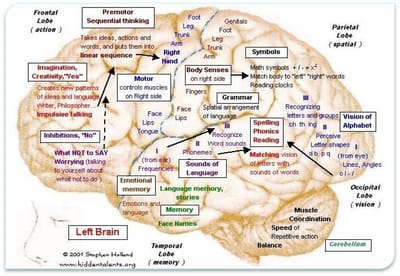What does learning need?



It's more than just opportunity and well designed learning experiences.
Each part of our brain has a very specific function. For a person to be able to read, for example, you need to be able to:
If just one of these brain functions is not working so well then reading becomes very difficult or next to impossible.
The good news is that this can be changed. We now know that our brains are plastic. They can be strengthened so that the functions are strong enough to do the job that is needed of them.
If learning is a problem for you or someone you know:
Each part of our brain has a very specific function. For a person to be able to read, for example, you need to be able to:
- remember what a letter and whole word looks like (visual memory),
- have the ability to hear and blend sounds into words ( c + a + t = cat) (phonological awareness),
- have a lexical memory (vocabulary) that is able to remember each word,
- have the ability to control the movement of the eyes so they move across the page smoothly (fine muscle control),
- understand what it is the words mean (comprehension), and
- be able to put concepts together to make meaning.
If just one of these brain functions is not working so well then reading becomes very difficult or next to impossible.
The good news is that this can be changed. We now know that our brains are plastic. They can be strengthened so that the functions are strong enough to do the job that is needed of them.
If learning is a problem for you or someone you know:
- Call Joanne on 04 100 451 34
- Contact NeuFocus
- or connect on Facebook


